Gigabyte W291-Z00 CPU Performance
At STH, we have benchmarked every single and dual socket AMD EPYC 7001 combination available and we have at least a pair of each EPYC SKU in the lab. Normally with this type of review, we would focus solely on all nine of the current AMD EPYC single socket options that you have in the Gigabyte W291-Z00. Since a big question for buyers is going to be AMD EPYC v. Intel Xeon we are going to add in a few single and dual Intel Xeon configurations to show the differences.
Running through our standard test suite generated over 1000 data points for each set of CPUs. We are cherry picking a few to give some sense of CPU scaling.
Python Linux 4.4.2 Kernel Compile Benchmark
This is one of the most requested benchmarks for STH over the past few years. The task was simple, we have a standard configuration file, the Linux 4.4.2 kernel from kernel.org, and make the standard auto-generated configuration utilizing every thread in the system. We are expressing results in terms of compiles per hour to make the results easier to read.
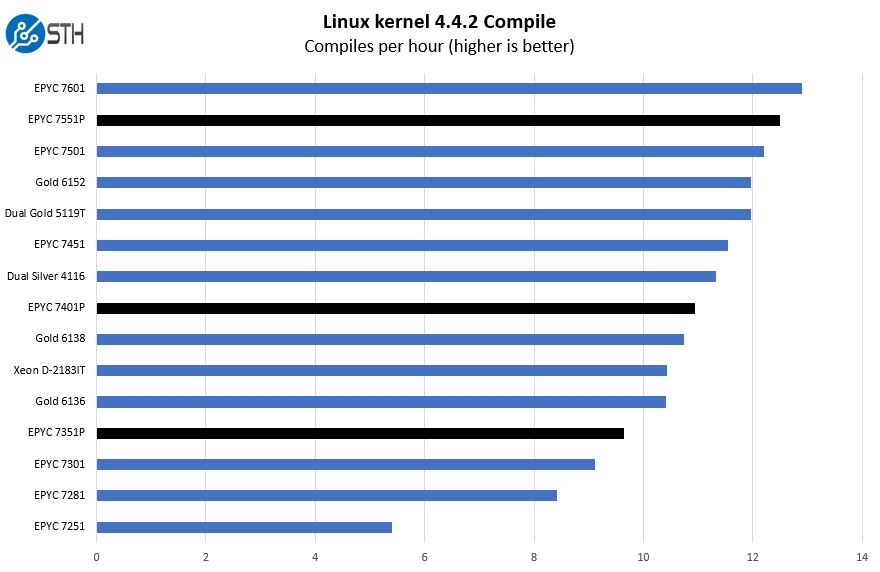
We are going to highlight the P series CPUs in this section so you can look at the Dell EMC configurator and see why the P series CPUs are such a strong value in the market. The other key trend is that the AMD EPYC 7251 is the least expensive part here. With eight cores on four NUMA nodes, the performance bump between the AMD EPYC 7251 and EPYC 7351P is so large that we suggest making the AMD EPYC 7351P the minimum SKU to order given the relatively low price impact.
c-ray 1.1 Performance
We have been using c-ray for our performance testing for years now. It is a ray tracing benchmark that is extremely popular to show differences in processors under multi-threaded workloads. We are going to use our new Linux-Bench2 8K render to show differences.
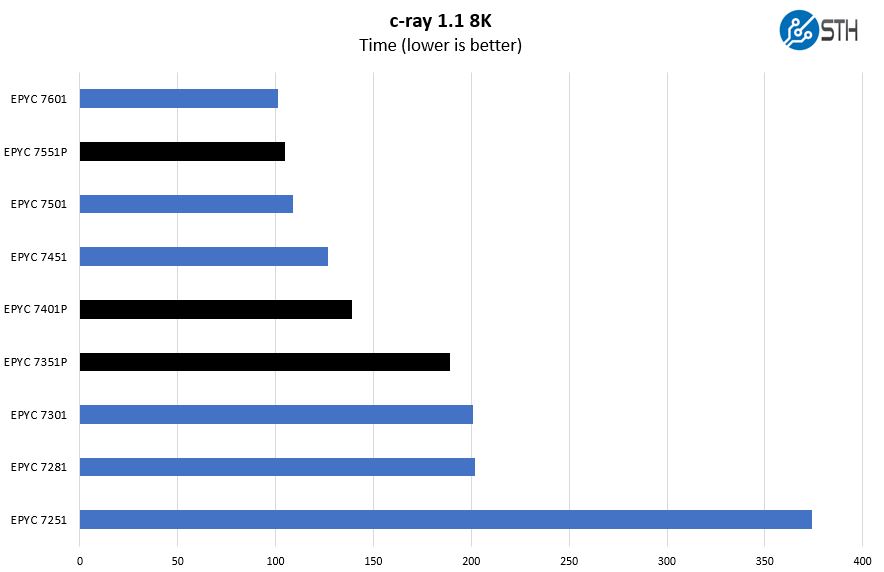
First, we wanted to highlight every single AMD EPYC single socket solution for the Gigabyte W291-Z00. We highlighted the P-series EPYC SKUs. These SKUs have great pricing from AMD, so we see them as being the most popular options.
7-zip Compression Performance
7-zip is a widely used compression/ decompression program that works cross-platform. We started using the program during our early days with Windows testing. It is now part of Linux-Bench.
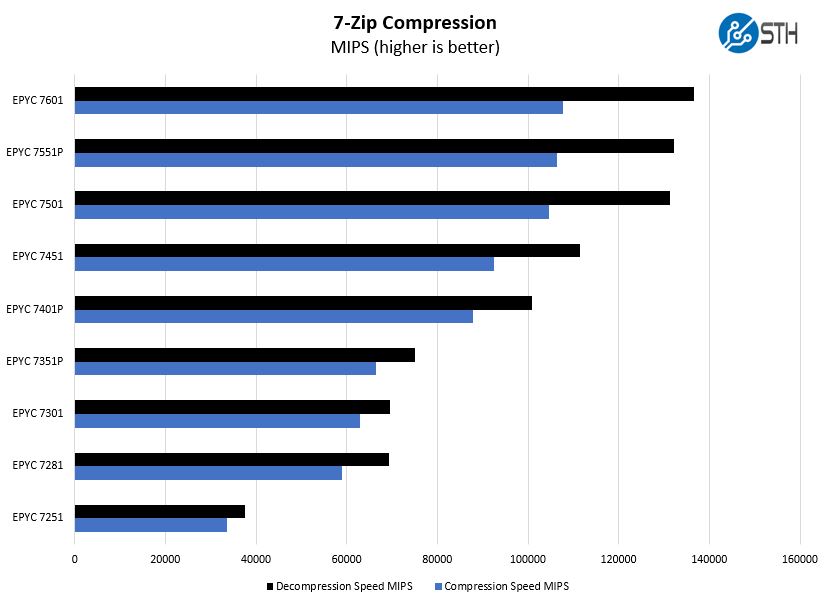
If you are starting to notice a pattern here, it should be clear that the AMD EPYC 7551P is a better single-socket value than the AMD EPYC 7501. The EPYC 7601 also offers a minor performance upgrade, but the EPYC 7551P is a better value. We tried the AMD EPYC 7371 16-core high clock speed CPU. That is a 205W TDP part which is beyond the 180W TDP specifications of the server. In some tests, we saw thermal throttling due to the small CPU cooling solution used so we are omitting those results here.
OpenSSL Performance
OpenSSL is widely used to secure communications between servers. This is an important protocol in many server stacks. We first look at our sign tests:
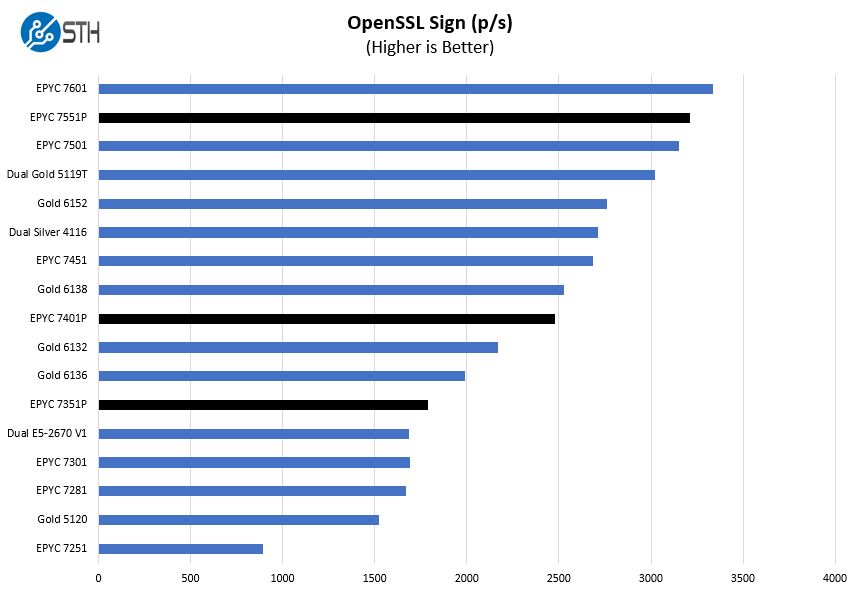
Here are the verify results:
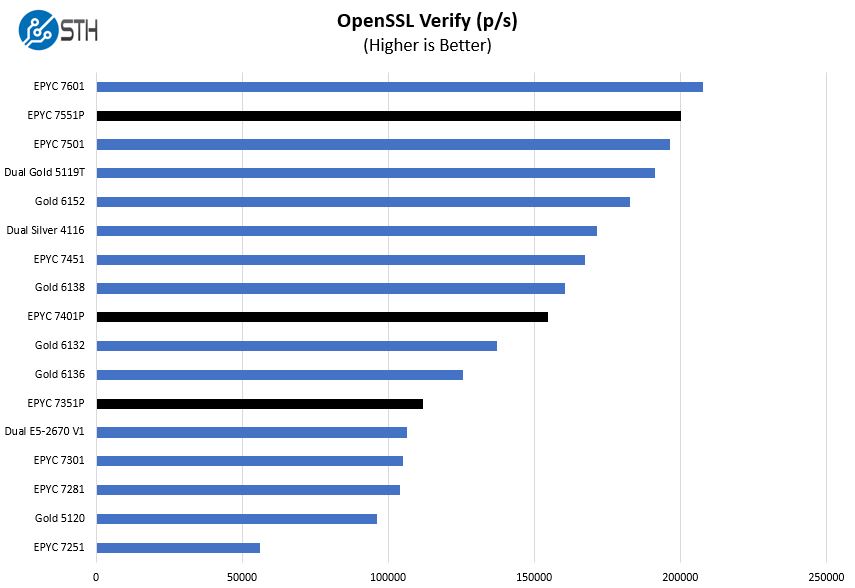
We highlighted the AMD EPYC “P” series parts again. For those looking at upgrading from legacy platforms. The single socket AMD EPYC 7351P bests dual Intel Xeon E5-2670 CPUs meaning one can trade legacy dual socket servers for a new single socket option.
Chess Benchmarking
Chess is an interesting use case since it has almost unlimited complexity. Over the years, we have received a number of requests to bring back chess benchmarking. We have been profiling systems and are ready to start sharing results:
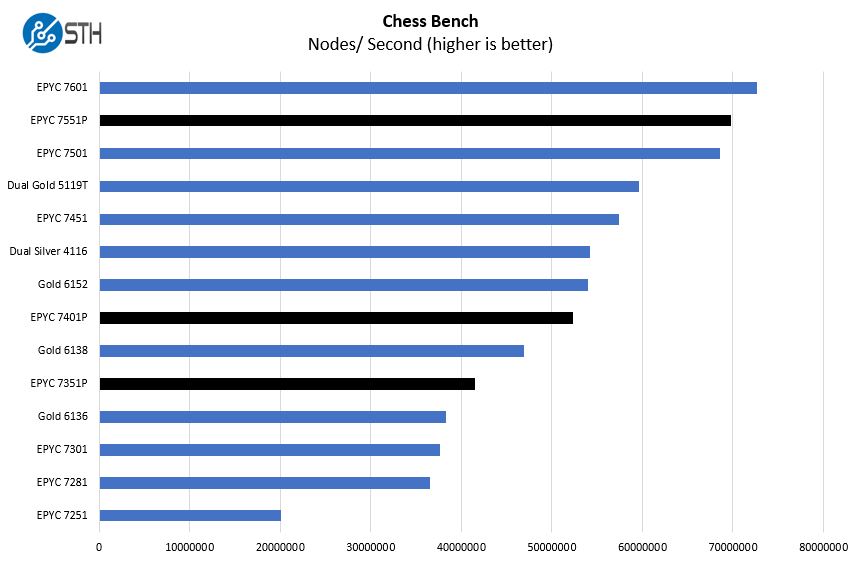
Again, using the P series parts will significantly lower your CPU costs over Intel Xeon Scalable single and dual socket solutions. On a per-core basis, Intel Xeon Scalable is leading here because the EPYC 7371 results are omitted.
GROMACS STH Small AVX2/ AVX-512 Enabled
We have a small GROMACS molecule simulation we previewed in the first AMD EPYC 7601 Linux benchmarks piece. In Linux-Bench2 we are using a “small” test for single and dual socket capable machines. Our medium test is more appropriate for higher-end dual and quad socket machines. Our GROMACS test will use the AVX-512 and AVX2 extensions if available.
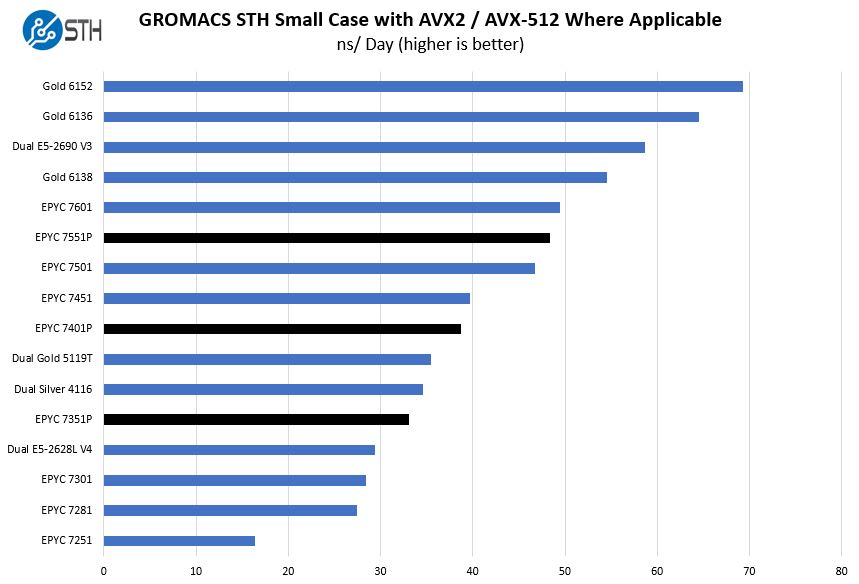
The AMD EPYC 7001 series CPUs support AVX2, but not the newest AVX-512 instruction set of Intel Xeon Scalable. In some workloads that have been optimized for AVX-512, that is a significant disadvantage. Intel does not give all of the Xeon parts dual port FMA AVX-512 so AMD’s AVX2 implementation effectively trounces the Intel Xeon Gold 5100, Silver, and Bronze CPUs in this test. Still, the Intel Xeon Gold 6100 or Xeon Platinum range is superior when AVX-512 can be used.
Next, we are going to look at the Gigabyte W291-Z00 power consumption and noise before moving onto the STH Server Spider and our final words.



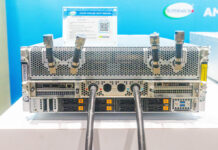
Why not the MZ31? what, slightly larger dimensions?
https://www.gigabyte.com/us/Server-Motherboard/AMD-EPYC-7000
Gigabyte MZ31-AR0, 180w tdp, two SFP+, 16 RDIMM’s, PCIe 3.0 four x16 & three x8
Gigabyte MZ01-CE1, 180w tdp, two 1GbE, 8 RDIMM’s, PCIe 3.0 four x16 & one x8
Excellent and thorough review as usual. Love the tag
“the Gigabyte W291-Z00 … the only option … is the best option.” Lol 8)
Hi ekv – The MZ31-AR0 does not have enough room behind the PCIe slots to fit full-length GPUs. You can read more about it in our Gigabyte MZ31-AR0 Review.
Thanks for this review, Patrick! Great info. I don’t suppose you have four mi60’s kicking about? An all AMD test would be very cool.
Hi hoohoo – unfortunately not. I agree it would be interesting, but it is a bit hard for us to fund that type of project.